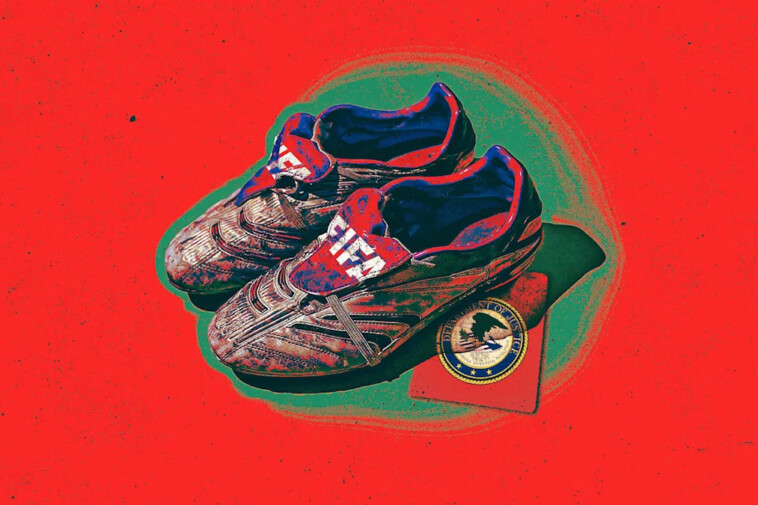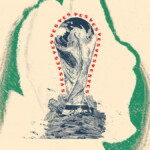The “war room” inside the FBI field office at 26 Federal Plaza in New York filled on the evening of May 26, 2015, with nervous excitement. Attorneys and investigators waded through security, then up to the 23rd floor, to oversee a transatlantic takedown that would shake international soccer. Plainclothes police would pound on hotel doors in Zurich, and arrest prominent FIFA officials; and before long, 10 years ago Tuesday, an unprecedented U.S. probe of “rampant, systemic, deep-rooted” bribery plaguing the beautiful game would burst into public view.
So, after months of painstaking work, dozens of sleep-deprived prosecutors and special agents gathered for their seminal moment. And as they waited, with a 161-page indictment under seal, some pondered the magnitude of what they were about to unleash.
Advertisement
“This,” one remembers thinking, “is gonna change the history of global soccer.” But what, they wondered, would the full impact ultimately be?
And 10 years later, some are disappointed or bothered by the complicated answer.
“FIFA,” the non-profit FairSquare wrote in a recent report, “didn’t fix the structural flaws that ultimately led the U.S. authorities to intervene in the first place.”
Their case quickly erupted into the biggest corruption scandal in modern sports history. It eventually led to 31 guilty pleas and multiple trial convictions. It recovered hundreds of millions of dollars. It triggered a reckoning at FIFA, the global soccer governing body at the center of the storm, and led to a raft of promised reforms.
Advertisement
But a decade later — according to interviews and conversations with dozens of current and former soccer officials, governance experts and attorneys, including some who investigated or prosecuted the U.S. Department of Justice case, many of whom spoke on the condition of anonymity — some of those promises seem empty. Reforms have been rolled back. “It’s all window dressing,” says Joseph Weiler, a former member of FIFA’s governance committee.
FIFA, ever since 2016, has argued the opposite. Spokespeople say the organization has been professionalized and transformed. “Today,” FIFA president Gianni Infantino told Yahoo Sports last month, “we work in a clear way, a transparent way, and an ethical way.” Insiders point to increased oversight of the billions of dollars that FIFA has since distributed to its member associations. Most believe the bribes once “endemic,” the ones attached to marketing and media deals for decades, have subsided.
But the bribes, as one expert says, “were a symptom of a larger governance problem.” The presidents of FIFA, its regional confederations and national soccer federations, critics say, are bound together by a network of patronage that allows them to act with “impunity,” perhaps even “outside the rule of law.”
Infantino, who replaced the disgraced Sepp Blatter when Blatter was ousted by the 2015 scandal, has cultivated this network rather than reformed it. He has dismantled or circumvented checks on his power. He has become “a modern autocrat,” or, in the words of former FIFA governance committee chairman Miguel Maduro, “a king supremo that makes deals with a few people, and those deals are then imposed across the pyramid of football.”
Advertisement
This concentration of power in relatively few hands, experts point out, is precisely what enabled the unchecked bribery U.S. investigators uncovered. But it’s also the type of underlying flaw the Department of Justice could not correct. Although a few U.S. officials saw their case as a chance to “effectuate systemic change throughout a global organization that really didn’t play by any rules,” and although their indictment described FIFA as akin to the mafia, they did not charge the organization itself. Instead, the federal statute underpinning the case essentially forced them to classify FIFA and its confederations as “victims,” ones that had been defrauded by corrupt individuals.
And so, as reforms unraveled, the U.S. officials — most of whom have since left the Department of Justice — could only watch from afar, and perhaps rue what one calls “a bit of a lost opportunity, to say, ‘Let’s go out and fix this up.’”
On May 27, 2015, media gathered outside the Hotel Baur-au-Lac where Swiss authorities conducted an early morning operation to arrest several top FIFA officials and extradite them to the United States on federal corruption charges.
(- via Getty Images)
The culpable victim
When the scandal erupted on that morning of May 27, 2015, “FIFA” and rampant corruption became inseparable. It was “FIFA Officials Arrested on Corruption Charges,” per the breaking news story in the New York Times. It was FIFA’s election and annual Congress that had been disrupted. It was FIFA’s headquarters that Swiss authorities soon raided. Although most of the indicted defendants were more closely tied to marketing companies or FIFA member associations — or the continental confederations of North and South America, CONCACAF and CONMEBOL — the saga became known as “FIFAgate.” When Richard Weber, chief of the IRS’ Criminal Investigation unit, prepared a punchy line for the U.S. government’s bombshell announcement, he went with: “This really is the World Cup of fraud, and today, we’re issuing FIFA a red card.”
Advertisement
So it was “FIFA” that flooded front pages worldwide. It was FIFA whose president, Blatter, under immense public pressure, soon resigned. The popular narrative pitted U.S. law enforcement against soccer’s global regulator. ESPN’s opus, “The FBI vs. FIFA,” was sold as “The exclusive account of how a small band of federal agents and an outsized corrupt official brought down the sports world’s biggest governing body.”
But that, former U.S. officials insist, was not the intent. “The goal,” says Mike Gaeta, a veteran FBI agent who directed the first few years of the investigation, “wasn’t at all to reform FIFA.” In fact, as they pored over bank records, flipped corrupt executives into cooperators and constructed the case, they were wary of how the world might perceive them. They did not want to shut down tournaments or enrage soccer fans, who, they worried, might ask critically: Why is the world’s game any of the U.S. government’s business?
So they built their own narrative. It was awkward but necessary to align with the “honest services wire fraud” statute they used to bring the case. FIFA, CONCACAF and CONMEBOL “were corrupted,” Acting U.S. Attorney Kelly Currie said as his office unveiled the indictment, “and in that sense, they’re the victims.”
Prosecutors, of course, understood the irony and intellectual tension of their framing. Incredulous fans and journalists asked: Had soccer really been corrupted by a handful of criminals? Or, rather, had corrupt soccer institutions enabled, and perhaps even incentivized, the criminality?
Advertisement
Federal law, though, had no time for the nuanced answer. The victim, however culpable, could not also be a perpetrator. The DOJ did not “bring down FIFA,” as some experts still put it. “What FIFA does internally,” Currie said in 2015, “is a matter for FIFA and its constituent members.”
Comedian Simon Brodkin (not pictured) throws dollar bills at FIFA president Joseph S. Blatter during a press conference at the Extraordinary FIFA Executive Committee Meeting at the FIFA headquarters on July 20, 2015, in Zurich.
(Philipp Schmidli via Getty Images)
Relevant reforms are ‘gone’
Amid the subsequent uproar, with sponsors fleeing and its bottom line bleeding, FIFA convened a “Reform Committee,” which wrote that “the current crisis should also be considered as a unique opportunity for FIFA to renew itself.”
“Significant modifications to [FIFA’s] institutional structure and operational processes are necessary to prevent corruption, fraud, self-dealing and to make the organization more transparent and accountable,” the committee, which comprised two representatives from each of FIFA’s continental confederations, wrote in its final report.
Advertisement
The report, delivered to FIFA’s executive board in December 2015 — just as U.S. authorities were preparing to unseal a new indictment charging 16 more soccer officials with racketeering, wire fraud and money laundering — included dozens of recommendations. Some were adopted and codified at an extraordinary FIFA congress in February 2016. “We are opening a new chapter,” FIFA’s acting president at the time, Issa Hayatou, told delegates that day. Hours later, the delegates elected Infantino, who said: “A new era is starting for FIFA as we speak.”
And that, for months and eventually years, became the company line. “The crisis is over,” Infantino said less than three months later. It jibed nicely with “victim status,” an official designation for which FIFA petitioned the U.S. government less than a month after Infantino took office. FIFA, the rhetoric went, had been robbed by its own officials; now that they were gone, FIFA was clean and could be a worthy steward of the hundreds of millions of dollars forfeited by the robbers and promised by the U.S. government to global soccer development.
FIFA ultimately spent tens of millions of dollars on lawyers to secure victimhood and, it admitted, to “avoid prosecution in any future indictment.” And in 2021, after a years-long fight, the Department of Justice agreed to remit up to $200 million-plus to a fund established under the FIFA Foundation. “I want to sincerely thank the U.S. Justice authorities,” Infantino said in a statement. “The truth is that, thanks to their intervention back in 2015, we have been able to fundamentally change FIFA from a toxic organization … to a highly esteemed and trusted global sports governing body.”
In the five-year interim, though, and the four years since, Infantino has unwound and undermined some of the reforms. As FIFA expanded its executive board to a 37-member Council, in theory to democratize decision-making, it also granted extensive power to a “Bureau of the Council,” an exclusive group comprising Infantino and the six confederation presidents, who can meet and make private decisions whenever Infantino pleases.
Advertisement
He and his deputies also compromised the independence of multiple key committees. An audit and compliance chairman, Domenico Scala, and members of the new governance committee resigned in protest. The chairmen of the ethics committee’s two chambers were both ousted and said in a joint statement the “politically motivated” move put a “de facto end to the reform efforts.” Maduro, the governance committee chairman, was also pushed aside after resisting Infantino’s alleged pressure.
More recently, term limits have been stretched or scrapped. A bloated standing committee system, which was stripped down in 2016 to “improve efficiency” and discourage patronage, is being restored and expanded. The reforms have become “a paper tiger,” Mark Pieth, the leader of FIFA’s 2011 Independent Governance Committee, told a Swiss newspaper. “Everything relevant is gone.”
FIFA, in response to criticism, has consistently pointed to the DOJ’s restitution as proof of recovery from the scandal. But the U.S. Attorney’s office in charge of the case clarified last year that it “has not endorsed the effectiveness of any of FIFA’s current reform efforts.”
And critics argue those efforts largely failed. “A few bad apples were taken out,” Maduro says, “but the tree that produces them stayed in place.”
FIFA president Gianni Infantino gives a thumbs up after a FIFA Council Meeting at the FIFA headquarters on Oct. 14, 2016, in Zurich.
(Philipp Schmidli via Getty Images)
What the DOJ did do was hold dozens of people accountable for wrongdoing. Former prosecutors and agents also believe they spooked and deterred would-be criminals going forward. But did they eradicate bribery in soccer?
Advertisement
“People in and around a lot of money who have been conducting themself a certain way for years — it’s very tough for them to change,” one former U.S. law enforcement official says. “They’ll adapt and improve the way they do things to stay under the radar.”
What’s changed, that former official says, is that “things are quiet.” There is no longer a steady drumbeat of enraging allegations. There is no known ongoing investigation with anything remotely close to FIFAgate’s scope. When U.S. Attorneys went public with their investigation last decade, they hoped other countries would take the proverbial baton and run; but relatively few did. In fact, as U.S. authorities probed soccer, according to two people close to the case, foreign counterparts would occasionally thank them and tell them: You guys are the only ones willing and capable of doing this.
They were willing, in part, because soccer and national politics weren’t intertwined; and capable because they had the backing of strong laws, peerless resources and an aggressive extraterritorial mandate.
But now, with the 2015 case on its last legs, some wonder whether circumstances have changed.
Advertisement
“Now,” one former prosecutor says, “you can’t even fathom a case like this even really mattering.”
Now, experts question whether a repeat is even feasible. The Trump administration has paused enforcement of a key anti-corruption law. The Supreme Court in 2023 limited the application of the “honest services fraud” statute. A district judge subsequently overturned two convictions in the DOJ’s soccer case, because, she wrote, “the honest services wire fraud statute does not encompass foreign commercial bribery.” (The U.S. Attorney’s office has appealed.)
In general, says Alexandra Wrage, a Canadian anti-bribery expert, “international standards, and certainly U.S. standards, have lowered” — and “dipped to meet FIFA.”
FIFA, meanwhile, now boasts of “excellent relations with President Trump [and] the Trump administration.” Infantino, who has eagerly nurtured the relationship, recently welcomed U.S. Attorney General Pam Bondi and FBI Director Kash Patel, two Trump loyalists, to FIFA’s offices in Miami. Their meeting “underlined the collaboration that exists between FIFA and the United States of America government,” Infantino said a few days later. With the inaugural Club World Cup, the 2026 men’s World Cup and the 2031 women’s World Cup all set to be held in the U.S., political pressure could impede any follow-up corruption investigation. “I think self-interest would absolutely override any other consideration,” Wrage says.
Advertisement
And so, FIFA’s critics have largely lost hope. They increasingly see a European Union intervention as the only avenue to reform.
The U.S. case, in the words of Maduro, “was a missed opportunity.”
This is Part 1 of a two-part series on how power reshaped the world’s game. Read Part 2: The ‘legal bribery’ and duality of Gianni Infantino’s FIFA.



